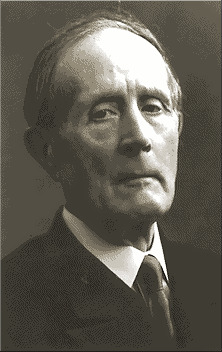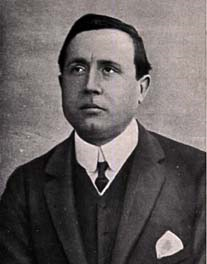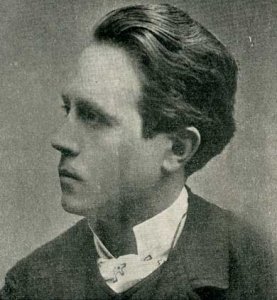<Back to Index>
- Writer and Literary Critic José Augusto Trinidad Martínez Ruiz (Azorín), 1873
PAGE SPONSOR



José Augusto Trinidad Martínez Ruiz, also known as Azorín (June 8, 1873, Monòver - March 2, 1967), was a Spanish writer and literary critic.
José Martínez Ruiz was born in Monovar, Alicante in 1873. His father was from the town of Yecla and a member of the conservative party; he practiced law in Monóvar and was from a middle class traditional family (he later became mayor, representative and follower of Romero Robledo). His mother was born in nearby Petrer. Azorín was the oldest of nine brothers. He studied at the boarding school of the Piarists in Yecla for eight years. After working for a time, he attended the University of Valencia to study law in the late 1880s.
Ruiz lived in Madrid and first worked as a journalist. From 1888 to 1896 he studied in Valencia, where he became interested in Krausismo and anarchism.
He used the pseudonyms of "Fray José", in The Catholic Education of Petrer, and "Juan of Lily" in The Defender of Yecla, etc. As a journalist, he wrote for a number of periodicals, including a newspaper edited by the Valencian writer Vicente Blasco Ibáñez. He wrote numerous theatrical critiques praising the works of Angel Guimerá and Benito Pérez Galdós. In 1895, Azorín published two pieces on literary anarchists and social notes, in which he presents the main anarchist theories of the time. During this time he was a political radical. Azorín became an admirer of the liberal Antonio Maura, who founded a party to fight the culture of "caciques", which he saw as the anti - democratic cancer of Hispanic politicians.
But, by the time of Francisco Franco's ruling over Spain, Azorín had established himself in his literary career in Paris. He had become extremely conservative and had no problems with Franco's dictatorship.
Using mostly short sentences, in both his fiction and his essays he emphasized the small but enduring elements and events in history and in one's life. In his view, time consists of a series of repetitions; this notion of time has been described as "timeless".
He died in Madrid on March 2, 1967, at the age of 93 from natural causes. Azorin was the longest lived of the writers of the Generation of 98. He had coined the name of this movement in 1913.